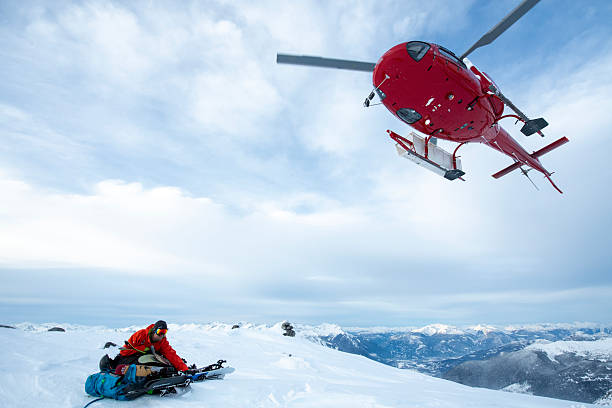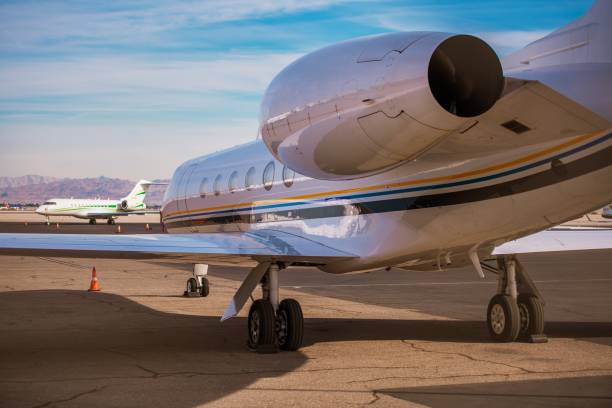Concierge Medical Travel: What ParaFlight Offers That Airlines Can't

When medical emergencies strike during travel or when patients require specialized care across borders, traditional commercial airlines often fall short of providing the comprehensive support needed. Enter concierge medical travel services like ParaFlight, which bridge the gap between standard air transportation and critical healthcare needs. This specialized sector has grown exponentially, with the global medical tourism market expected to reach $273.72 billion by 2027, representing a compound annual growth rate of 12.2% from 2022.
Understanding Concierge Medical Travel
Concierge medical travel goes far beyond booking a flight and hoping for the best. It's a comprehensive service that combines medical expertise, logistical coordination, and personalized care to ensure patients receive seamless transportation and medical support throughout their journey. Unlike commercial airlines, which operate on fixed schedules and standardized services, concierge medical travel providers offer tailored solutions that prioritize patient health and comfort above all else.
The distinction becomes particularly crucial when considering that approximately 1 in 600 commercial flights experiences a medical emergency, according to the New England Journal of Medicine. While airlines are equipped to handle basic medical situations, they lack the specialized equipment, trained medical personnel, and flexible scheduling that complex medical cases require.
What ParaFlight Brings to Medical Travel
24/7 Medical Support and Coordination
ParaFlight's primary advantage lies in its round-the-clock medical support system. Unlike airlines that rely on volunteer medical professionals among passengers or basic first aid training for crew members, ParaFlight maintains a network of qualified medical professionals who accompany patients throughout their journey. This includes registered nurses, paramedics, and when necessary, specialized physicians who understand the unique challenges of medical care at altitude and in transit.
The service extends beyond the flight itself. ParaFlight's medical coordinators work directly with healthcare providers at both origin and destination points, ensuring seamless continuity of care. This level of coordination is impossible with commercial airlines, which have no medical infrastructure beyond basic emergency response protocols.
Specialized Medical Equipment and Aircraft Configuration
Commercial airlines are limited by federal regulations and space constraints in their medical equipment offerings. Most carry basic automated external defibrillators (AEDs) and oxygen supplies, but lack the sophisticated life support systems that critically ill patients may require.
ParaFlight, in contrast, operates aircraft specifically configured for medical transport. These may include:
- Advanced life support equipment including ventilators and cardiac monitors
- Specialized stretcher systems that can accommodate patients who cannot sit upright
- Climate-controlled environments optimized for patient comfort
- Infection control systems crucial for immunocompromised patients
- Medication refrigeration units for temperature-sensitive treatments
Flexible Scheduling and Route Planning
Perhaps the most significant limitation of commercial airlines for medical travel is their rigid scheduling system. Flight delays, cancellations, and connections can be more than inconvenient for medical patients – they can be life-threatening. The average commercial flight delay in the United States is 18 minutes, but medical emergencies don't wait for airline schedules.
ParaFlight offers on-demand scheduling, allowing departures to align with medical needs rather than airline timetables. This flexibility extends to route planning, enabling direct flights to destinations that might require multiple connections on commercial carriers. For patients with limited mobility or those requiring continuous medical monitoring, the ability to minimize travel time and eliminate connections can be crucial to their wellbeing.
Privacy and Dignity in Medical Transport
Commercial air travel can be challenging for patients dealing with medical conditions that affect their mobility, appearance, or require ongoing care. The cramped quarters, public setting, and lack of privacy can add unnecessary stress to an already difficult situation.
ParaFlight's private aircraft environment ensures patient dignity and reduces anxiety. Patients can travel with necessary medical equipment without space constraints, receive medications on schedule, and maintain privacy during what may be a vulnerable time. This psychological comfort factor contributes significantly to patient outcomes and recovery.
The Growing Need for Specialized Medical Travel
The demand for concierge medical travel services has grown substantially in recent years. Several factors contribute to this trend:
Medical Tourism Growth
The global medical tourism industry has experienced remarkable growth, with over 11 million patients traveling internationally for medical care annually. Countries like Thailand, India, and Mexico have become major destinations for procedures ranging from cosmetic surgery to complex cardiac interventions. This growth has created a corresponding need for specialized medical transportation services that can safely transport patients to and from treatment locations.
Aging Population Demographics
As populations age globally, the need for specialized medical care increases proportionally. The World Health Organization projects that the global population aged 60 and older will increase from 771 million in 2019 to 1.4 billion by 2030. This demographic shift creates a larger population requiring medical travel services, particularly for specialized treatments not available in all geographic regions.
Advances in Medical Technology
Paradoxically, advances in medical technology have both enabled more sophisticated treatments and created greater need for specialized transport. Patients undergoing cutting-edge treatments may require specialized equipment during transport, or may need to travel to centers of excellence where new technologies are available.
Comparing Costs: Value vs. Price
While concierge medical travel services like ParaFlight command premium pricing compared to commercial airlines, the value proposition becomes clear when considering the comprehensive nature of the service. Commercial airline tickets might cost hundreds of dollars, while medical transport services can cost thousands. However, this comparison fails to account for the full scope of services provided.
The cost of medical complications during commercial air travel can far exceed the premium paid for specialized transport. Emergency medical diversions during commercial flights cost airlines an average of $15,000 per incident, not including the potential costs to passengers who may face inadequate medical care or delayed treatment.
Moreover, the peace of mind that comes with knowing qualified medical professionals are monitoring patient care throughout the journey is invaluable for both patients and their families. The stress reduction alone can contribute to better patient outcomes and faster recovery times.
Case Studies in Medical Travel Excellence
Critical Care Transport
Consider a patient requiring transport from a rural hospital to an urban medical center for specialized cardiac surgery. Commercial airlines would require the patient to be stable enough for standard seating, navigate through busy airports, and potentially face delays that could compromise their medical condition. ParaFlight's approach involves:
- Pre-flight medical assessment and stabilization
- Continuous cardiac monitoring during transport
- Direct communication with receiving medical team
- Specialized cardiac equipment on board
- Ability to divert to alternate medical facilities if needed
International Medical Repatriation
When Americans abroad face serious medical emergencies, getting home can be complex. Embassy assistance typically focuses on connecting patients with local medical care, but doesn't address the logistics of medical transport back to the United States. ParaFlight's international medical repatriation services include:
- Coordination with international medical facilities
- Navigation of complex visa and customs requirements for medical transport
- Ensuring medical equipment meets international aviation standards
- Providing qualified medical personnel familiar with international medical protocols
Organ Transport Coordination
Time-sensitive medical situations like organ transplants require precise coordination that commercial airlines cannot provide. ParaFlight's organ transport services ensure:
- Immediate availability for time-critical transport
- Specialized storage and monitoring equipment
- Direct communication with transplant teams
- Backup contingency planning for weather or mechanical issues
Technology Integration in Medical Transport
Modern concierge medical travel services leverage technology to enhance patient care and operational efficiency. ParaFlight incorporates several technological innovations:
Real-Time Patient Monitoring
Advanced telemedicine systems allow medical professionals on board to communicate directly with specialists on the ground. This real-time consultation capability can be crucial for making in-flight medical decisions or adjusting treatment protocols based on patient response.
Electronic Health Records Integration
Seamless integration with electronic health records ensures that patient medical history, current medications, and treatment plans are accessible to medical personnel throughout the transport process. This integration prevents medication errors and ensures continuity of care.
GPS and Weather Monitoring
Sophisticated navigation and weather monitoring systems allow for real-time route adjustments to ensure the smoothest possible flight for patients. This is particularly important for patients with conditions that could be exacerbated by turbulence or altitude changes.
Regulatory Compliance and Safety Standards
Concierge medical travel services operate under strict regulatory oversight that goes beyond standard aviation requirements. ParaFlight must comply with:
FAA Medical Transport Regulations
The Federal Aviation Administration has specific requirements for medical transport services, including aircraft configuration standards, crew training requirements, and equipment certification. These regulations ensure that medical transport aircraft meet higher safety standards than commercial aviation.
Medical Equipment Certification
All medical equipment used during transport must meet both aviation and medical device standards. This dual certification ensures that equipment functions properly at altitude and under the unique conditions of air transport.
Staff Certification and Training
Medical personnel working with ParaFlight must maintain current medical licenses and receive specialized training in aviation medicine. This includes understanding how altitude affects various medical conditions and how to modify treatment protocols for the flight environment.
The Future of Medical Travel
As healthcare becomes increasingly specialized and global, the need for sophisticated medical transport services will continue to grow. Several trends are shaping the future of this industry:
Personalized Medicine Integration
As treatments become more personalized, the need for specialized transport that can accommodate unique medical requirements will increase. This might include transport of personalized medications, specialized monitoring equipment, or specific environmental controls.
Telemedicine Evolution
Enhanced telemedicine capabilities will allow for more sophisticated remote medical consultation during transport, potentially reducing the need for specialized medical personnel on every flight while maintaining high standards of care.
Sustainable Aviation
Environmental concerns are driving innovation in sustainable aviation fuels and electric aircraft technology. Future medical transport services may incorporate these technologies while maintaining the specialized capabilities required for medical transport.
Making the Decision: When to Choose Concierge Medical Travel
Several factors should influence the decision to use concierge medical travel services:
Medical Complexity
Patients with complex medical conditions requiring continuous monitoring, specialized equipment, or frequent medication administration are ideal candidates for concierge medical travel.
Time Sensitivity
When timing is critical – such as for organ transplants, emergency procedures, or time-sensitive treatments – the flexibility and reliability of concierge services become invaluable.
Geographic Challenges
Patients traveling to remote destinations or requiring transport from areas with limited commercial airline service benefit significantly from the flexible routing options available through concierge services.
Comfort and Dignity Considerations
For patients whose medical conditions make commercial air travel uncomfortable or potentially embarrassing, the privacy and personalized care of concierge services provide significant quality-of-life benefits.
Conclusion
The healthcare landscape continues to evolve, with patients increasingly seeking specialized care that may not be available in their immediate geographic area. Concierge medical travel services like ParaFlight represent a crucial bridge between traditional airline transport and the complex needs of medical patients.
While commercial airlines serve an important role in general transportation, they lack the specialized equipment, trained personnel, flexible scheduling, and comprehensive support systems that medical patients require. ParaFlight's comprehensive approach to medical transport – encompassing pre-flight medical assessment, specialized equipment, qualified medical personnel, and seamless coordination with healthcare providers – represents a quantum leap beyond what traditional airlines can offer.
As the medical tourism industry continues to grow and healthcare becomes increasingly specialized, the value proposition of concierge medical travel services becomes even more compelling. For patients and families facing medical travel decisions, understanding the fundamental differences between commercial airline transport and specialized medical transport services is crucial for making informed choices about their healthcare journey.
The investment in concierge medical travel services like ParaFlight represents not just transportation, but a comprehensive healthcare support system that prioritizes patient wellbeing, safety, and dignity throughout the travel experience. In an era where healthcare outcomes can depend on access to specialized treatments and facilities, this level of support isn't just luxury – it's essential healthcare infrastructure.















